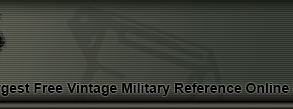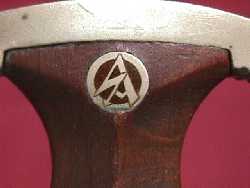
WWII GERMAN DAGGER - SA - E P & S MAKER -
The SA dagger represents one of the most affordable blades to collect. This is due to the fact that the daggers
were produced in the millions since 1933 to the end of the war. During its life span, more than 100
manufacturers
were known to produce the dagger. In addition, not all manufacturer's produced the entire dagger, some simply bought
parts from other factories and followed through the steps of assembly. The assembling company would obtain plain blades
and place their logo on them.
In the early days of production there was virtually no quality control except for the standards set by each
independent manufacturer. It was not until 1934 when the
RZM
establishes some means of control. As a result,
differences in the sizes of the handles, scabbards and blades can be found in the earlier samples. Making it
sometimes impossible to interchange parts between daggers.
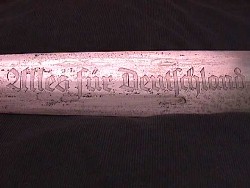
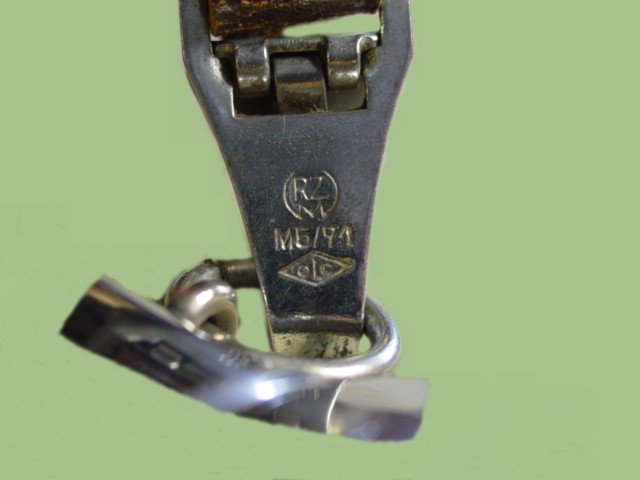
|
This page is a recognition and identification guide for German bayonets. Multiple
detailed photos of a specific sample are provided. Descriptions point out specific
points that should be noted.
One of the most commonly asked questions is "How much is my German bayonet worth?".
A price guide is included here to address this question. The value of the Nazi bayonets is
reviewed over a period of several years. A trend can be observed. The present worth
of the police sword in the collector's market is illustrated.
This service is provided free of charge to the visitor/enthusiast courtesy of
MilitaryItems.com,
a company dedicated
to the preservation of military history and to providing quality military antiques and
collectibles to museums, institutions and the general public.
|
|
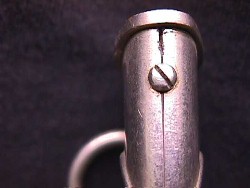
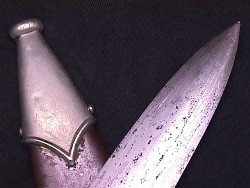
The design of the dagger is simple and elegant. The wooden handle has a pronounced "Coke"
botlte shape. The pommel is of metal construction. It is cut to fit the contour of the
handle. A round nut is placed at the very top. This piece holds the dagger together.
Removing the nut reveals the tang of the dagger. Additional markings may be found there.
Note that removing the nut requires a special tool. If it is not used it is possible to
inflict some dents on the faces of the nut. The SA logo is placed inside
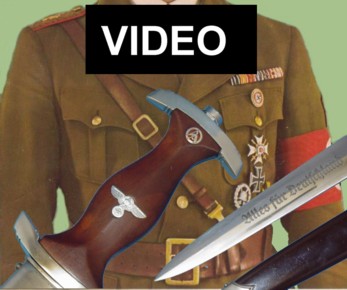
|
a circle just below the pommel.
The handguard is made of the same material as the pommel. Both ends point slightly upwards.
The top surface shows some ribbings.
The throat and tip of the scabbard come with metal fittings attached by two screws. The throat
section has a single suspension ring. This is where the leather
hanger
is attached when the
dagger is worn with the dress uniform. The tip is capped with a small ball. This part is
frequently dented as the result of normal wear. The body of the scabbard is painted
brown to match the color of the handle.
The blade is stiletto type with a double edge ending in a sharp point.
The manufacturer's logo has been placed at the base of one side of the
blade. The logo consists of the initials E.P. & S. followed by the image
|
of a man striking down with a blade. The name "Solingen" is found just below the image.
Solingen was a well renown town for that manufactured a large number of the blades of the
Third Reich. The blade featured here shows some pitting.
All blades are inscribed with the phrase "Alles Fur Deutschland" which translates to
"All for Germany". The dagger feature here is an early war SA dagger.
The handle is made from dark wood.
The center of the handle has a silver SA eagle inserted. With wings fully extended and the
head facing to the right. The detail of the plumeage of the wings is exquisite. The claws are
clutching a wreath surrounding a swastika. The inside of the wreath has some pebbling.
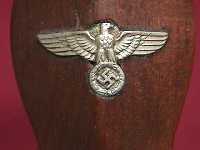
Many German edge weapons are currently
reproduced.
It is becoming more difficult to be able to tell the fake ones from the real ones because
the quality of the reproductions is improving. The collector must become familiarized with
the construction style and materials employed in the manufacturing of this item.
Attention to the details is critical in order to be able to determine the authenticity of
the collectible.
If you have an interest is seeing other edge weapons of the Third Reich, you can do so by going
to our
WWII German daggers and Swords
identification guide, Where we cover blades from the Heer (Army), Navy (Kriegsmarine), Air Force
(Luftwaffe) and other organizations.
| 

